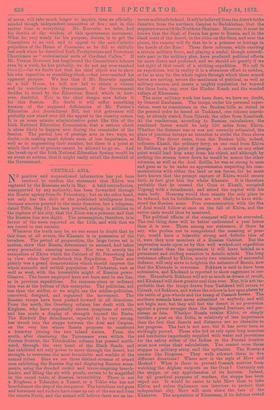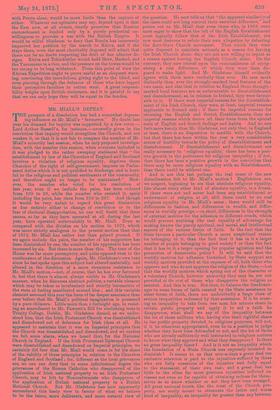CENTRAL ASIA.
NO positive and unquestioned information has yet been received to confirm the statement that Khiva was captured by the Russians early in May. A bald contradiction, unsupported by any authority, has been forwarded through the Renter agency from St. Petersburg ; but on the other hand, not only has the drift of the published intelligence from German sources pointed in the same direction, but a telegram, -dated Tiflis, May 17, has been printed, stating, in addition to the capture of his city, that the Khan was a prisoner, and that the Russian loss was slight. The presumption, therefore, is in favour of the news reported on the 13th, and with that we are forced to rest content.
Whatever the truth may be, no one seems to doubt that by this time, at all events, the Khanate is in possession of the invaders. The period of preparation, the large forces set in motion, show that Russia, determined to succeed, had taken every precaution ensuring success. Nor was it merely the occupation of Khiva which the Cabinet of St. Petersburg had in view, when they undertook this Expedition. Their aim plainly was a grand demonstration which should impress the -whole nomadic and settled population of Turkestan, east as -well as west, with the irresistible might of Russian power. Observe. The forces employed have not been sent in one line, as in previous expeditions. No common-place or ordinary idea was at the bottom of this enterprise. The politician, not less than the soldier, or we might say the soldier-politician, conceived, designed, and organised the movement. The Russian troops have been pushed forward in all directions. From the north, the Orenburg column has dealt with the Kirghese, who have repeatedly shown symptoms of revolt, and has made a display of strength beyond the Emba. The Kinderli Bay detachment, reported to be very strong, has struck into the steppe between the Aral and Caspian, on the very line where Russia proposes to construct a tramway joining the two inland waters. From the south, after chastising the Turcomans even within the Persian frontier, the Tchickishlar column has pressed north- -ward, through the very heart of the Black Sands, and has exhibited not only power to move through the desert, but strength to overcome the most formidable and warlike of the nomad tribes. Here we see three distinct streams of armed men exhibiting the Russian flag and displaying Russian arma- ments, using the dreaded rocket and terror-inspiring breech- loader, and filling the air with proofs, certain to be magnified in the round tents, of Russian invincibility. There is not a Kirghese, a Tchaudor, a Yomnt, or a Tekke who has not heard almost the step of the conqueror. The battalions and guns and horsemen and rockets have come up out of the sea and from the remote North, and the nomad will believe there are an im-
ever, doubtful. This is the chief danger now before it The main military work has been done, we have no doubt, for this Session. No doubt it will suffer something by General Kaufmann. The troops, under his personal super- because of the supposed deficiencies of Mr. Forster's vision, were to concentrate in the Boukan hills, as stated in Education Act Amendment Bill, but that grievance will the general order he issued at Tashkend, one column march- probably now stand over till the appeal to the country comes. ing, as already stated, from Djizzak, the other from Kasalinsk. It is on some minute administrative point like this of the At the rendezvous, according to Russian calculations, the Irish National Education Commission, that a serious check combined forces would be only 150 miles from Khiva. is alone likely to happen now during the remainder of the Whether the distance was or was not correctly estimated, the Session. The partial loss of prestige acts in two ways, no place of junction betrays an intention to strike the Oxus above doubt,—in making small defeats seem of less importance, as Khiva. The direct route, from the Bonkan hills, indeed, well as in augmenting their number, but there is a point at indicates Khanli, the ordinary ferry, on one road from Khiva which that sort of process cannot be allowed to go on. And to Bokhara, as the point of passage. A march on any other the break-up of the Irish National Education System would be point would lead him away from his object, and although by an event so serious, that it might easily entail the downfall of striking the stream lower down he would be nearer the other the Government. columns, as well as the Aral flotilla, he was so strong in men and guns as to be under no apprehension respecting his com- munications with either the land or sea forces, for be must have known that the prompt capture of Khiva would secure both, in fact give him the whole Khanate. It is therefore probable that he crossed the Oxus at Khanli, occupied Urgend with a detachment, and seized the capital with his main body. Hesarasp would then remain the only place to be reduced, but its fortifications are not likely to have with- stood the Russian arms. Free communication with the Sea of Aral would follow at once on the fall of Khiva, and the entire oasis would thus be mastered.
The political effects of the conquest will not be overrated. The real thing done will be better understood a year hence than it is now. Those among our statesmen, if there be any, who profess not to comprehend the meaning of pres- tige, would have a tolerably strong and definite idea of it, were they now members of a Russian Cabinet. But the impression made upon us by this well worked-out expedition is far weaker than. the impression it will leave behind as a permanent and abiding sensation in Asiatic minds. The long resistance offered by Khiva, nearly two centuries of successful defiance, will only serve to heighten the estimate of Russia, now that the Khanate is overcome. Bokhara is said to have been submissive, and Khokand is reported to show eagerness in ser- vice. Henceforth Bokhara will not so much as dream of revolt, and Khokand will show greater zeal than ever. Nay, it is not im- probable that the troops drawn from Tashkend will return to Djizzak, vici Bokhara, and waken the echoes in her open places by the rattle of gun-wheels and the tramp of Cossack torses. The southern nomads have never submitted to anybody, and will not begin now, but they will feel the desert is no protection against a power stronger than the despised Iranians, and per- sistent as fate. Whether Russia retains Khiva, or simply fortifies a post on the Delta, is relatively of less importance than the fact that deserts and distances are no obstacles to her progress. The fact is not new, but it has never been so strikingly proved. Those who bid us rely upon long marches and territories imperfectly supplied with water and provisions for the safety either of the Indian or the Persian frontier must now revise their calculations. You cannot cross those steppes in military array, said the optimists. The Rassiars answer like Diogenes. They walk athwart them in five different directions! Where now is the E e gis of Mery and Meshed ? What is there to prevent Cossack sentries from watching the Afghan outposts on the Oxus ? Certainly not the steppe, or any apprehension of its horrors, Indeed, for all practical purposes of warfare, the steppe has been wiped out. It would be easier to take Mery than to take Khiva, and unless diplomacy can interfere to protect that independent city, Mery will soon share the fate of the Khanates. The acquisition of Khorassan, if its defence rested
with Persia alone, would be more facile than the capture of either. Whatever our optimists may say, depend upon it that the East now, at all events, clearly perceives that Russian encroachment is limited only by a purely prudential un- willingness to provoke a war with the British Empire. It would be wilful blindness to deny that Russia has immensely improved her position by the march to Khiva, and if she stays there, even the most charitably disposed will admit that there can be no doubt respecting the drift of her ulterior de- signs. Khiva and Tchickishlar would hold Merv, Meshed, and the Turcomans in a vice, and the pressure on the towns would be too strong to be long withstood. From this point of view the Khivan Expedition ought to prove useful as an eloquent warn- ing, convincing the incredulous, giving sight to the blind, and even piercing through the defences of those who have lapped their perceptive faculties in cotton wool. A great responsi- bility weighs upon British statesmen, and it is painful to say that we can only hope they will be equal to the burden.



































 Previous page
Previous page